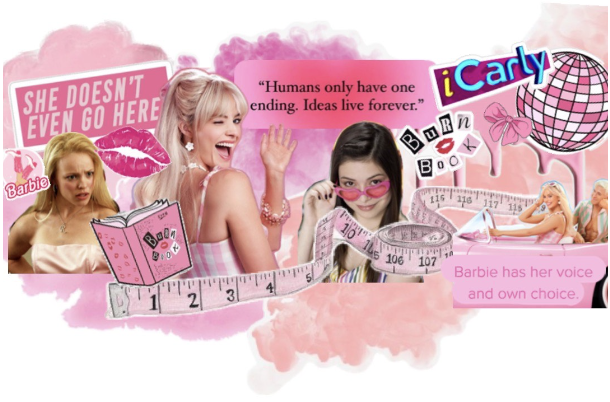Every day after school once the digital clock on my stovetop struck 3 p.m., I’d rush to my living room, curl up on my cozy couch and eagerly wait to hear, “I know / You see / Somehow, the world will change for me …”
“iCarly” was my life. From Sam and her butter sock to Spencer’s sculpture bursting into flames, I looked forward to an incredible 20 minutes every day. But, growing up watching Nickelodeon shows like “iCarly,” “Victorious” and “Sam & Cat,” I couldn’t help but compare myself to these actresses with their ultra-thin physique and “perfect bodies.” I’d look down at myself, mold my stomach with my hands and wonder, “Why don’t I look like them?”
I was eight.
I’m not the only one who struggled with this perception. Particularly in the 90s and 2000s, the media sensationalized this “idealistic” body — unrealistic to the average human population. When children grow up idolizing these characters from TV shows and movies, they want to look like them.
But they can’t.
As a result, eating disorders, body dysmorphia and chronic mental illnesses arise, leaving teenagers in a state of mental crises, depression and a toxic perception of their physical and mental identity. But, as fads come and go, a new wave of body image is emerging within the media industry, bringing to shore a new normal for the “perfect body”: all shapes and sizes.
Recent forms of media have worked to combat the previous stereotype of societal beauty standards. In the 2024 readaptation of “Mean Girls,” Reneé Rapp plays Regina George, one of the most iconic characters in 2004, queen-bee of North Shore High and idolized by millions of adolescent girls.
Originally played by Rachel McAdams, the 2004 version of “Mean Girls” portrays the stereotypical ultra-thin, blonde-hair, blue-eyed “popular girl” as the epitome of beauty. With this image, growing up, girls were bound to compare themselves to Regina and find themselves with as many insecurities as Regina herself.
With comments like “I’ve got man shoulders,” “I’m only eating foods with less than 30 percent calories from fat” and a plethora of others, young girls likened themselves to the toxicity of Regina — if she has some flaws, I must be entirely composed of flaws.
Yet the 2024 version of this classic shifts from this unhealthy perception of Regina to a character full of confidence and body positivity. Obviously, the iconic lines and storyline from “Mean Girls” still hold, yet Rapp is more conscious in her portrayal of Regina regarding public perception of body idealism.
Rapp quit the Broadway musical version of “Mean Girls” in 2020 due to constant harassment about her body from fans and producers. Thus, she sought freedom from the stage and focused on her own artistry within the music industry.
“The conversation around my body is fucking stupid,” Rapp said to Teen Vogue. “I’m like, ‘Just shut the fuck up.’ I mean, you’re so obsessed. You are clinically so obsessed. And I get it. I know I look good. You don’t need to talk about it.”
Rapp snapped back to the public as a body positivity figure, promoting self-confidence and finding your own identity. By playing an originally strictly “skinny” teenager as an actress with healthy, womanly features, Rapp sets the expectation of not conforming to Hollywood’s idealization of the “perfect body type” like that of Regina George.
“I’m not a little Disney princess musical theater girl. I’m a tall girl. I’m a bigger girl. I don’t have a tiny little voice. I have a very loud voice,” Rapp said to Dramatics. “Whatever you identify as or whatever you don’t identify as, do not let anyone limit the world that you create for yourself … Never apologize for being a boss.”Another recent creation within the film industry promoting body positivity is Greta Gerwig’s “Barbie.” Yes, Margot Robbie is the definition of “Barbie beauty,” but Gerwig’s inclusion of Barbies from all ethnicities and body types emphasizes the importance of body acceptance. Even though the film focuses primarily on women’s empowerment, Gerwig still encompasses the idea of self-love in a deprecating society. Gerwig counteracts the decades-long damage Barbie dolls have pushed upon young girls, from them comparing themselves to proportionally inaccurate dolls, to pursuing the idea that “girls can do anything” in today’s society.
These productions indicate a trend of media attempting to transition into a society of body positivity. Although there are still plenty of flaws, I am happy to see the film industry begin to create role models for little girls who promote self-acceptance and internal happiness.
While I wish there were more of an emphasis on that growing up for people in my generation, I am happy to know that the little girls curled up on their couches anxiously awaiting their favorite TV show will not worry as much about how they compare to the actresses. Young girls are now more commonly represented in media through the lens of body positivity, and with time, they can watch shows without comparing their bodies but rather compare positive personalities.








